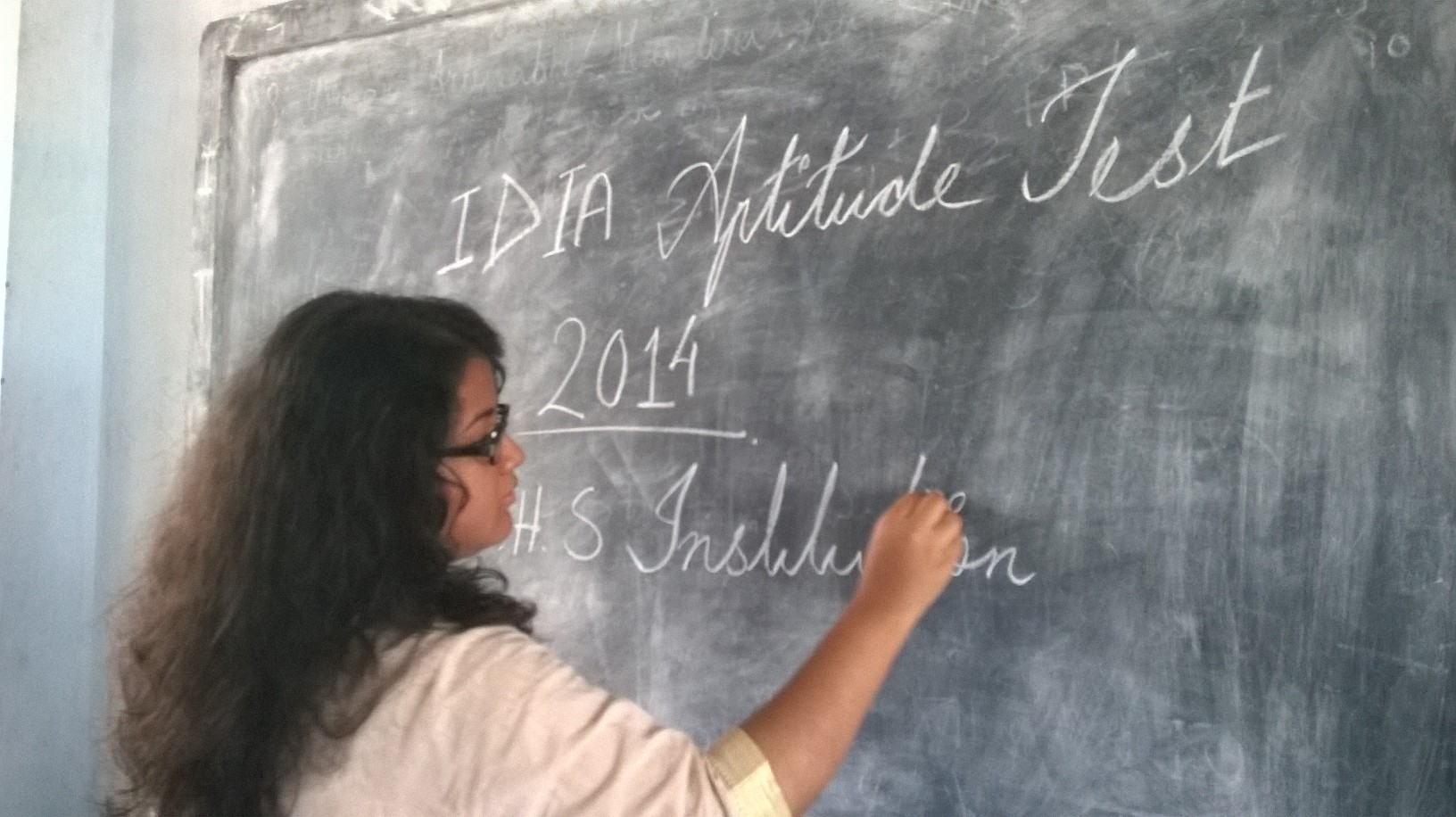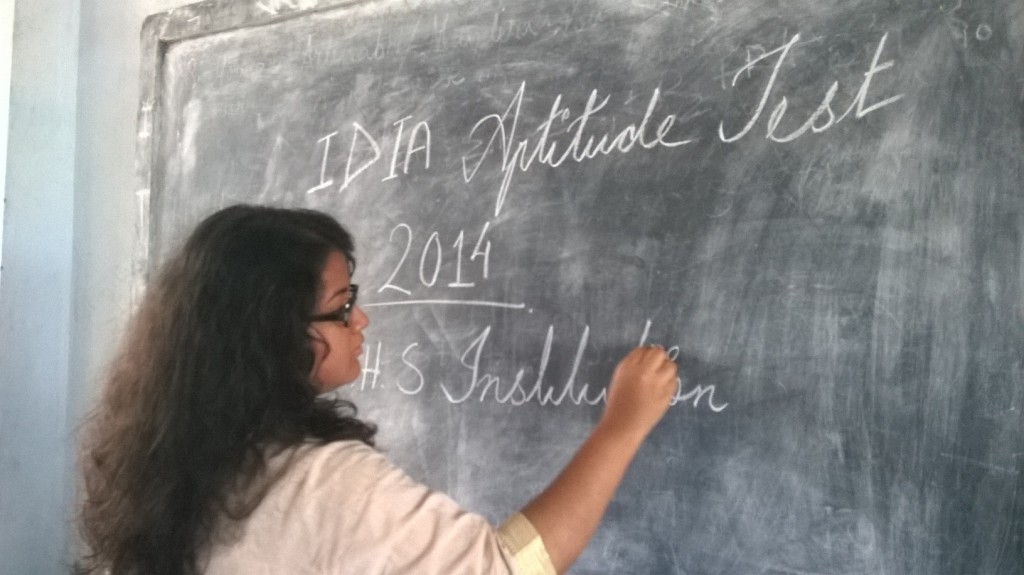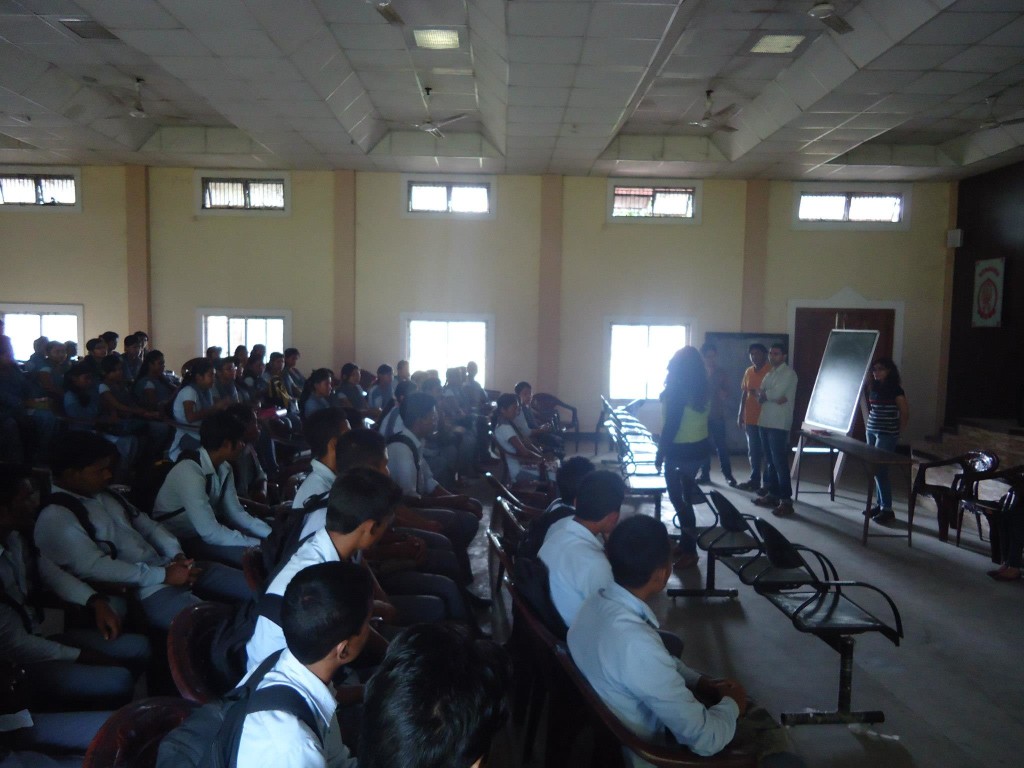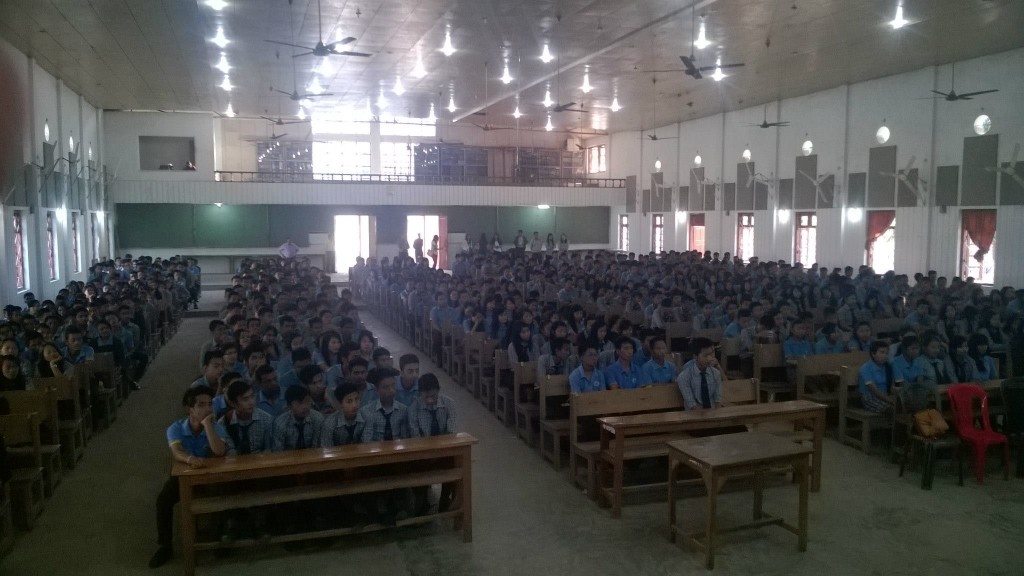Nipasha Mahanta is a student of NUJS, Kolkata and IDIA Team Leader for NE India.
They tell you that it is the biggest and the greatest quarter of your life. They fool you into believing that if you win this game, the world will bow down before you. They feed you to thrive in the spirit of rivalry pumped by hatred where you are motivated to live through many a sleepless nights burning the midnight lamp and skip day or two’s hygiene chores not to achieve and maintain excellence but to guiltelessly enjoy the defeated expression which would overshadow the otherwise blatant arrogance for that so called “class rival”. A gap of a mere two years and a parallel tread in a chosen road incongruent with the conventional and popular choices, one realises the futility of such empty wars which were fought at the school battleground. The consecutive usage of these two terms seems paradoxical. School should be the ground where seeds of brotherhood and virtues are sowed. It should not stimulate the sadistic nerves in one. All this definitely seem abnormally preaching in its spirit devoid of any relevance to the real scenario. The above stance might just be dismissed on the premise of being full of impractical motives and theoretical notions. The above blabbering might miss the aimed relevance when I confess to the fact that I devoted a year of complete “donkey slavery” in the pursuit of making it to a top notch law school and I, very well realised that dream. I do not wish my memoir to trigger pessimistic nausea, rather, I wish otherwise. By the end of the piece, I want to present to the reader a first-hand experience of finding passion in a state of utter disillusionment in the law school journey. It would be completely wrong to say that it is an expression of wishful thinking. It is, rather otherwise. It explores how my law school journey though strives in the languor of mediocrity till now yet, no longer, makes me crib about it. It sketched how the emotion of being the well chosen agent of change in the lives of a few unlucky downtrodden, cooks the most blissful dish which when melts in your palate, transports you to the seventh heaven of satisfaction for being able to attach some value, no matter how minuscule, to life as a whole. Two years into law school has been a metamorphosis for me on a personal stature. The toxic judgmental mind set has been shed, the lack of courage to face failure no longer haunts me to wake up every morning, the negative mind construction to expect to always win has been dismantled thoroughly and the fact that increasing and decreasing returns is not regular phenomenon which blankets all goodwill endeavours and the consolation that it is all right even if one’s bona fide actions do not get well received has sunk in my being firmly.
Hailing from Assam, one of the picturesque sites of North-East India, combined with the impact of taking up law school education for a conducive field of graduation and the choice of devoting a major chunk of law school life in trying to ease the lives of budding learners by not only being the agent of incepting unfound dreams in their minds but also being a catalyst in their preparation and walk alongside till they are capable enough to undertake the adventurous challenge on their own. Increasing Diversity by Increasing Access to Legal Education ( IDIA) is not just an NGO. It is much more than that. Though, on one hand, law school wipes out most of your irrationality and in that bet diminishes your religious affiliation, it also ends up making you agnostic. What prevents you to get absolutely drowned/enlightened in atheism is initiatives on the likes of IDIA. I would like to distance myself from making generalised statements on theism. However, when I view the role expected of me under the IDIA banner, I realise I am one of the few chosen ones to be able to serve mankind in my own small manner.
Education is the only path of liberation from all societal bondages. It is true that there no longer remains any foreign contingents looming overhead our countrymen constantly posing threats of pushing them is states of uncertain warfare in future but it would be an example of shameless denial if it is concluded that each part of the country is equally exposed to all opportunities. Law education has time and again proved itself to be the machinery to any social transformation. It is built upon tradition, needs of the society and works in favour of progressive gallops. The advent of the national law schools in India; the comprehensive and innovative five year degree programme, has revolutionised the sub-standard degree in which law education breath in India. This, again, is not the wholesome version of the picture. The national law school era has rather reinforced elitism which reverberates in the law fraternity and has further distanced the rulers, the protectors of the rules and the ruled. Family tradition, availability of resources (both monetary and social environmental) are what which decides the new entrants in the legal field. This, in a way, completely defends the purpose which law education proposes to achieve. Again, regional representation languishes in crisis at such hubs of imparting knowledge of law. Limiting this educational excellence to only a few minds hailing from the economically privileged, upper caste, English speaking mass dwelling in the plethora of overwhelming opportunities in the developed cities creates an imbalance. Empathisers, not sympathisers, are the ones who can spearhead the movement of restoration of rights of the aggrieved. The problems of our country are varied across societal and geographical contexts and these can only be addressed when representatives from these cross sections are give power to ventilate the unique issues which is suffered by the group they belong to so that they not only have the enthusiasm to start the battle of rights but also maintain the zest in the face of all odds fighting till reasonable demands are met. Assam is one of the ‘Seven Sisters’ of North-East India and Guwahati is the commercial/educational hub of the region. There lies immense quantum of angst around a number of junctures from the annexation of the region into the Indian Union being a game of fraud political play to bouts of encounters of ego clashes because of continued negligence in terms of allocating resources, respect and recognition from the mainstream national power holders, to unhealed wounds of being mocked upon for holding dissimilar racial and cultural heritage. The question whether these are mere allegations or do they encapsulate reality is something from which I would refrain to instil debates. The purpose my mentioning the above context is to present a clear picture to reader how opportunities are amiss in the region , how, consequently, talents die in utter oblivion of their true calls, how it is a risk to take up something unconventional out there and how regional backwardness makes an otherwise smooth journey a rather threatening one.
I was reading at my study in the scorching month of May, 2011 when the local news channels in Guwahati flashed the success story of Padmini Barua, AIR 1 CLAT 2011. She is among the only two students from North-East India featuring in the top 500 who had managed to clear CLAT that year. She gave me a reason to consider an idea which I was so callously dismissing since long. When I say Guwahati is the commercial and educational hub of North-east India, I cherish and cringe at the same time on this fact. Guwahati ‘boasts’ itself of having the two operative CLAT coaching centres in North-East India led by India’s premier law entrance examination coaching ‘businesses’. I have deliberately chosen the word ‘businesses’ to elucidate the meagre and low quality coaching imparted there. This, however, bears no effect on the unreasonable fees they demand which is not at all at par with what their plate offers. I consider myself lucky to be born in one of the few developed and well connected cities of North-east India and hence, got the resources (although those were far from being sufficient) required to prepare for the test. However, this has not been true for students from other parts of North-east India. I would like to insert a disclaimer here that this memoir in no way wishes to be a self –acclaimed boast of victory amidst all troubles. I believe I am no better than an average Indian student who happened to be lucky despite of the environmental constraints. I still remember gaping at awe and respect to one of my classmates who travelled from Shillong (some 4 hours away from Guwahati) to attend the weekend sessions at my coaching centre. I was aghast at the below average success rate of the students of North-east who took CLAT that year (2013). All these built up as a fierce source of frustration in my mind. The tipping point was when one of my classmates who happened to be fortunate enough to be adorned with all qualities of a hard-working student but was unfortunate enough to not have the monetary resources to back it up had to forgo the NLU seat which she achieved at NLU, Assam (NLUJAA). Finally, when I managed to get a seat at one of the coveted law schools of India, NUJS, IDIA became the apt solution to all my woes. It gave wings to my earnest wish to be the harbinger of opportunities (at least in the sector of law education) to the people of my region breaking the shackles of upper income class and English speaking hegemony. IDIA enters the battle field at that time- to neutralise the inherent multitudinal class and regional biases which run as an undercurrent in law school fraternity. It aims to erase financial incapacity as a negative agent to kill potential. It becomes the magic wand and casts a magic spell answering the woes of economical backwardness.
However, life is not a fairy tale and so is my IDIA engagement far from being what one can call a cakewalk. Though IDIA strives for reaching out far and wide yet the inbuilt logistical contingencies have tried to dampen its schemes. However, human mind is biologically atuned to find solutions whenever any hurdle rises and the volunteers at IDIA are inspired to hone the problem-solving instinct. On this, one of the supreme master minds behind IDIA, Prof. Shamnad Basheer had commented in one of his engaging sessions with the volunteers , “I know there are problems in implementing the policies of IDIA. I know the road is not smooth. I do not want you to come to m with problems and surrender at that. I want you to come to me with solutions to problems.” Little was I able to grasp what he meant by ‘problems’ until my first two years of law school and volunteering at IDIA when I , myself, got exposed to the shocking realities at the sensitization and training camps in the states of Assam, Nagaland and Sikkim. The process of selecting deserving trainees is the toughest one. It is a myth that goodwill is always reciprocated honour. The North-east chapter of IDIA operates from NUJS, Kolkata. Indifference, doubts surrounding the organisation’s credibility, questions regarding its reasons for low profile campaigning, unthinkingly tagging IDIA as unauthentic and making it suffer the repercussions of fraudulent acts of other profit based coaching centres are only few of the troubles we face every year. Human beings are paranoid; it’s only the wavering intensity of the disease which saves a prescription of mental ill-being. A hand offered for help is disgruntled at more than a hand snatching away rights. The society has numbed people into thinking that there cannot at all be any good done without the giving end expecting anything is return. Though I have faced several questions to prove my authenticity, the most frequent one is “What will you get out of it?”. Incentives drives the man to wake up every morning, race through the day and retire at night. People fail to buy when we say that imparting opportunities to deserving candidates is our only incentive. I despise the connotations of the term ‘social work’. It is seen as something similar to altruism. I beg to differ on that vehemently. My engagement with IDIA is not a one way rewarding process. I derive utmost satisfaction my work. The fact that I hold a position to contribute the least bit to my people, the fact that there are some ten scholars who are being able to get law education because of my team and my unflinching toil and the fact that I am the help to people who need it and which, even I needed but could not get it, qualify as incentives which feature far above the clichéd numerical digit based remuneration. Our chapter conducts its month-long selection session involving only the students studying in class eleven in that scholastic year in the months of October-November in the targeted states of the region, publishes the final list of trainees by early January and kick-starts the training by early May, with exactly one year in hand for preparing the trainees. This chapter, being headed by profound and remarkable leaders before me, has been able to place a number of students from North-east across different law schools in India and have continuously funded their education expenses in different dimensions. As IDIA trainees, they are enrolled in the local coaching centres, allotted mentors who conduct timely evaluation and guidance sessions throughout the year from Kolkata, through virtual means and in-person visits. The trainees are also offered a month-long crash coaching sessions at NUJS, Kolkata subject to their willingness to travel all the way from North-east India. IDIA is not just a goodwill organisation. It is a movement against elitism and hereditary privileges. It seeks to distribute power from the concentration in the hands of the selected few to people from all strata of the society. The present pattern of CLAT is such that it is extremely biased towards well versants of the English language and towards the ones to whom technology is easily accessible. CLAT uses English as a ward-stick to measure an individual’s aptitude in legal reasoning. It’s present decision to hold the examination online has further aggravated the issue. It is a shame that vernacular languages are shown the red card and inability to access gadgets is sure enough to bury the dream of receiving quality law education. I would refrain from commenting a general statement but the level of disrespect shown to pragmatism by the initiators of such schemes is worth criticizing. The schemes are founded on the assumption that and well built prior skill of reading and writing English is essential for being able to acquire global knowledge and that the online formats do not require any computer skills except an average common sense is a myth. The objective of the examination of filtering students based on legal reasoning aptitude gets marred by these short-comings. I do not wish to ignite any anti-English education or anti-technology debate. What I wish to assert here is that the ones who have not been able to acquire the above ‘skill’ (mind you, not ‘aptitude’) because of their situational misfortune should not be thrown out of the race. This is because I have closely experienced fear, hostility, low self confidence in potential candidates hailing from rural-low income families studying in vernacular medium when exposed to conversation in English. I have experienced how the sight of the computer; something which they have only seen in televisions and the expectation that they be able to access internet in a place which thrives in constant turbulence, is enough to get them nauseated and scare them off the field. Whilst the knowledge of English language and computer skills should have come as extra weapons in the battlefield, they rather act as deterrents to turning dreams to reality. I have witnessed IDIA’s strong reservations against the aforementioned and I have been thoroughly involved in sympathising with the cause. IDIA’s battles are far from being won. However, considering that we are only few years old, I harbour extreme optimism in the struggles which IDIA takes up.
They say “With great power, comes great responsibilities” and I could not have agreed more before my stint with IDIA as the Team Leader of North-east chapter. It fills up with both joy and fear that I have the power not only to make people see new dreams, but also the resources to turn them into reality. I am vested with the expectation that I successfully select deserving candidates from the remotes corner of North-east India and expose them to the global window of knowledge. I have the power to wipe off tears of despair because of financial misfortune of budding potential is something which becomes a reason to wake me up every morning and also runs a chill down my spine every night thinking what if I falter. As the Team Leader of IDIA North-east chapter, I have time and again thanked time and circumstances to grant me the best ever volunteer force who are not ‘CV driven to work’ but who unconditionally devote their sincere efforts and energy to enlivening IDIA’s dream.
After all, the emotion triggered when a certain young lad/girl of your own hometown recognise you as an idol, refer you as their ‘Godmother’ (Cinderella alert; not a single bit of exaggeration there) and look up to with hope that you will help them change their own fate and dawn unprecedented light upon them is unparallel. It fills you up with overwhelming satisfaction, so much so that you do not mind spending a few hours for composing this piece of memoir, just before your end semester commences, because if it were possible you would never let IDIA be a past chapter in your life. No matter which walk of life you are at, every time you read/hear ‘IDIA’, your heart would wrench in happiness and would flash unbound smiles because IDIA is not just an organisation, it is a life changing experience.
 Serato DJ Crack 2025Serato DJ PRO Crack
Serato DJ Crack 2025Serato DJ PRO Crack












 Allow notifications
Allow notifications



I read with great interest and admiration the piece by nipasha Mohanta.i concur with the underlying thoughts that seem to have persuaded the writing. Willing to offer my services.